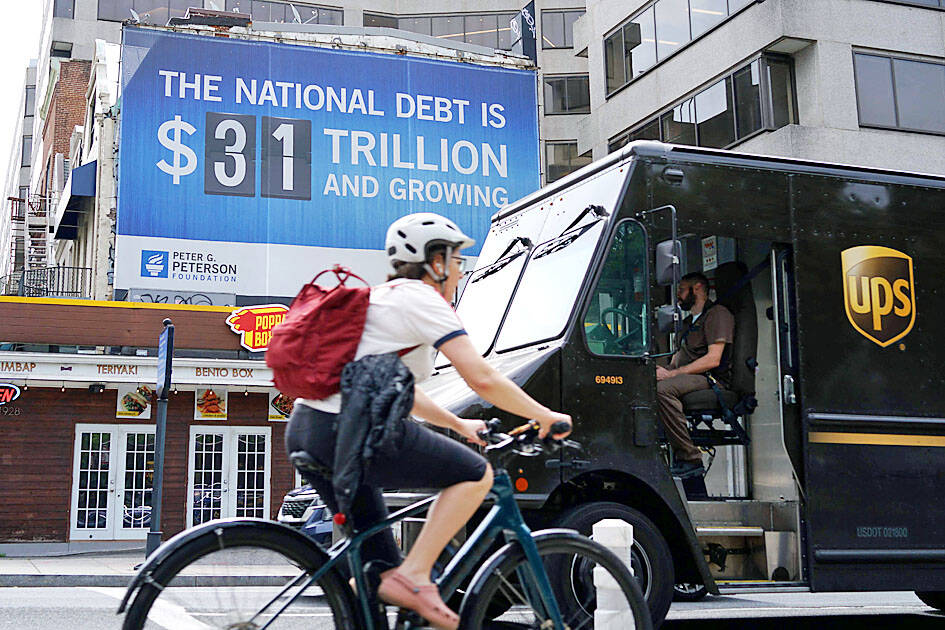Talks to avoid a US debt default were on a knife edge yesterday as US President Joe Biden said he would not accept “extreme” Republican demands, but said he remained optimistic.
“I still believe we’ll be able to avoid a default and we’ll get something decent done,” he told reporters at the G7 summit in Hiroshima, Japan.
With the US Department of the Treasury warning that the US government could run out of money as early as June 1 — triggering massive economic disruption in the world’s biggest economy and likely around the globe — the political battle in Washington has seesawed without any clear sign of resolution.

Photo: AFP
Republicans, who control the US House of Representatives, are demanding steep budget cuts as a price for allowing an extension of the government’s borrowing authority.
The White House is seeking to whittle down Republican demands, while saying that the traditionally uncontroversial annual debt ceiling increase is being weaponized for political gain.
Hopes for a settlement on Friday took a blow when Republicans walked out of negotiations, declaring a “pause.”
However, the talks restarted hours later, leading White House Press Secretary Karine Jean-Pierre to say that “we are indeed optimistic.”
Biden, on the other side of the world for the gathering of rich democracies, was briefed on the situation early yesterday, which was still Friday night in Washington, the White House said.
White House Communications Director Ben LaBolt said that “Republicans are taking the economy hostage and pushing us to the brink of default, which could cost millions of jobs and tip the country into recession after two years of steady job and wage growth.”
While Biden would not accept “extreme” Republican policies, “there remains a path forward to arrive at a reasonable bipartisan agreement if Republicans come back to the table to negotiate in good faith,” LaBolt said.
More borrowing is required by the US government just to meet expenditures already made, meaning that refusal by the Republicans to lift the debt ceiling would leave Washington unable to pay its bills, triggering an array of economic shock waves.
Republicans say that the more than US$31 trillion in US national debt is too high to accept and that there should be agreement on getting the books more balanced, rather than simply authorizing a still-higher debt allowance.
Democrats say that they are willing to discuss the budget, but that first the debt ceiling needs to be raised without condition so that the existing bills can be paid and US financial credibility preserved.
Briefly calling off the talks on Friday, US House of Representatives Speaker Kevin McCarthy said that “we’ve got to pause,” because “we can’t be spending any more money next year.”
Biden’s team says the raft of spending cuts being demanded by Republicans are fueled by the agenda of the party’s increasingly dominant hard-right wing.
Speaking to reporters, Biden expressed a willingness to be patient.
“It’s a negotiation. It goes in stages,” he said.
Asked if he was worried, he said: “Not at all.”

Kehinde Sanni spends his days smoothing out dents and repainting scratched bumpers in a modest autobody shop in Lagos. He has never left Nigeria, yet he speaks glowingly of Burkina Faso military leader Ibrahim Traore. “Nigeria needs someone like Ibrahim Traore of Burkina Faso. He is doing well for his country,” Sanni said. His admiration is shaped by a steady stream of viral videos, memes and social media posts — many misleading or outright false — portraying Traore as a fearless reformer who defied Western powers and reclaimed his country’s dignity. The Burkinabe strongman swept into power following a coup in September 2022

‘FRAGMENTING’: British politics have for a long time been dominated by the Labor Party and the Tories, but polls suggest that Reform now poses a significant challenge Hard-right upstarts Reform UK snatched a parliamentary seat from British Prime Minister Keir Starmer’s Labor Party yesterday in local elections that dealt a blow to the UK’s two establishment parties. Reform, led by anti-immigrant firebrand Nigel Farage, won the by-election in Runcorn and Helsby in northwest England by just six votes, as it picked up gains in other localities, including one mayoralty. The group’s strong showing continues momentum it built up at last year’s general election and appears to confirm a trend that the UK is entering an era of multi-party politics. “For the movement, for the party it’s a very, very big

ENTERTAINMENT: Rio officials have a history of organizing massive concerts on Copacabana Beach, with Madonna’s show drawing about 1.6 million fans last year Lady Gaga on Saturday night gave a free concert in front of 2 million fans who poured onto Copacabana Beach in Rio de Janeiro for the biggest show of her career. “Tonight, we’re making history... Thank you for making history with me,” Lady Gaga told a screaming crowd. The Mother Monster, as she is known, started the show at about 10:10pm local time with her 2011 song Bloody Mary. Cries of joy rose from the tightly packed fans who sang and danced shoulder-to-shoulder on the vast stretch of sand. Concert organizers said 2.1 million people attended the show. Lady Gaga

SUPPORT: The Australian prime minister promised to back Kyiv against Russia’s invasion, saying: ‘That’s my government’s position. It was yesterday. It still is’ Left-leaning Australian Prime Minister Anthony Albanese yesterday basked in his landslide election win, promising a “disciplined, orderly” government to confront cost-of-living pain and tariff turmoil. People clapped as the 62-year-old and his fiancee, Jodie Haydon, who visited his old inner Sydney haunt, Cafe Italia, surrounded by a crowd of jostling photographers and journalists. Albanese’s Labor Party is on course to win at least 83 seats in the 150-member parliament, partial results showed. Opposition leader Peter Dutton’s conservative Liberal-National coalition had just 38 seats, and other parties 12. Another 17 seats were still in doubt. “We will be a disciplined, orderly